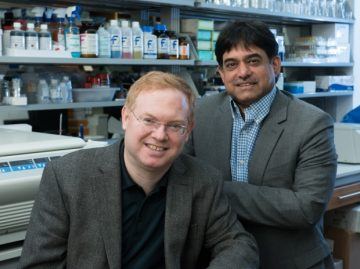From NYU News:
 The population of bacteria in the pancreas increases more than a thousand fold in patients with pancreatic cancer, and becomes dominated by species that prevent the immune system from attacking tumor cells. These are the findings of a study conducted in mice and in patients with pancreatic ductal adenocarcinoma (PDA), a form of cancer that is usually fatal within two years.
The population of bacteria in the pancreas increases more than a thousand fold in patients with pancreatic cancer, and becomes dominated by species that prevent the immune system from attacking tumor cells. These are the findings of a study conducted in mice and in patients with pancreatic ductal adenocarcinoma (PDA), a form of cancer that is usually fatal within two years.
…Experiments found that in patients with PDA, pathogenic gut bacteria migrate to the pancreas through the pancreatic duct, a tube that normally drains digestive juices from the pancreas into the intestines. Once in the pancreas, this abnormal bacterial mix (microbiome) gives off cellular components that shut down the immune system to promote cancer growth, say the authors.
Whatever the cause, the new study found that bacteria that are more abundant in pancreatic cancers – including groups of species called proteobacteria, actinobacteria, and fusobacteria – release cell membrane components (e.g. lipopolysaccharides) and proteins (e.g. flagellins) that shift macrophages, the key immune cells in the pancreas, into immune suppression. Experiments showed that eliminating bacteria using antibiotics restored the ability of immune cells to recognize cancer cells, slowed pancreatic tumor growth, and reduced the number of cancer cells present (tumor burden) by 50 percent in study mice. The researchers found that “bad” bacteria in pancreas tumors trigger immune cell “checkpoints” – sensors on immune cells that turn them off when they receive the right signal. These checkpoints normally function to prevent the immune system from attacking the body’s own cells, but cancer cells hijack checkpoints to turn off immune responses that would otherwise destroy them. Checkpoint inhibitors are therapeutic antibodies that shut down checkpoint proteins to make tumors “visible” again to the immune system.
More here.
